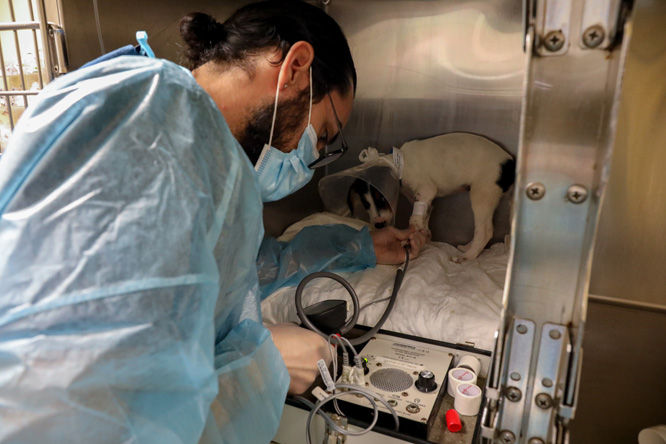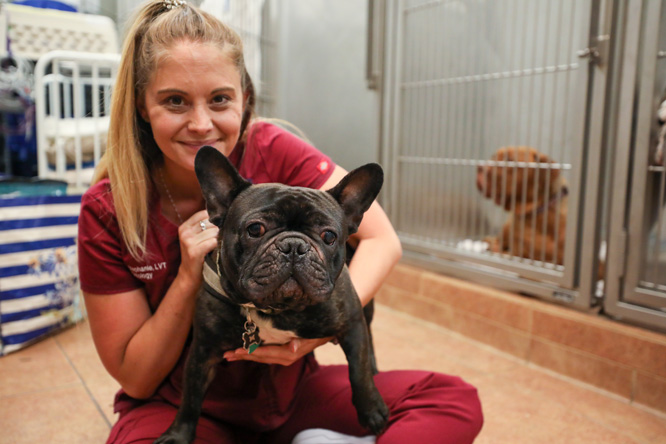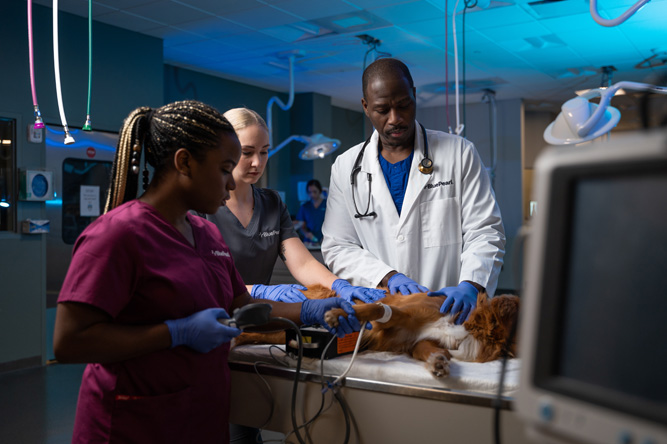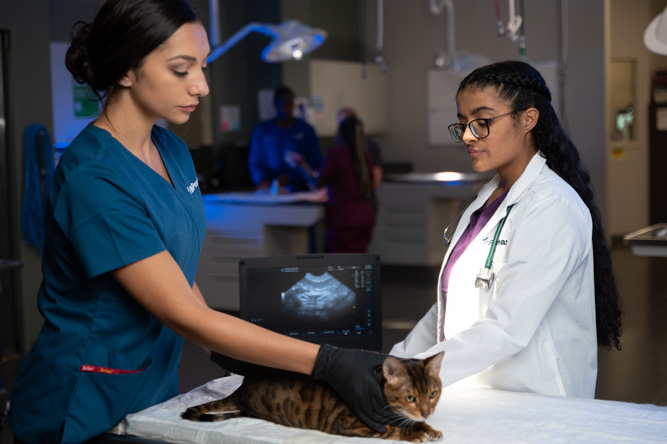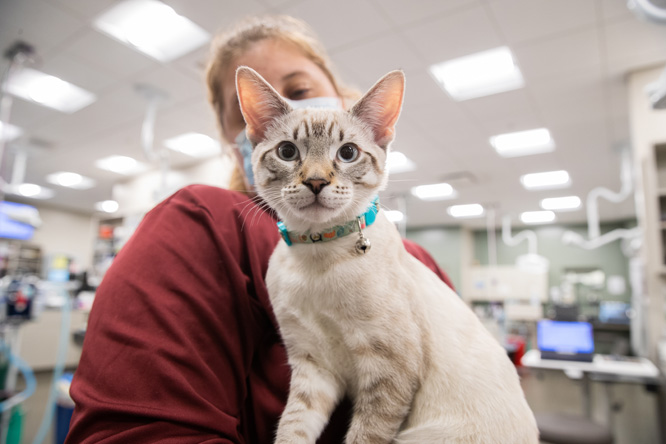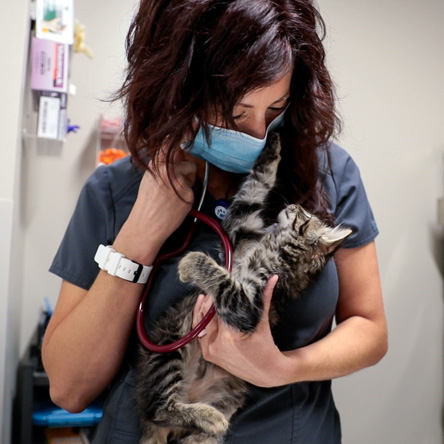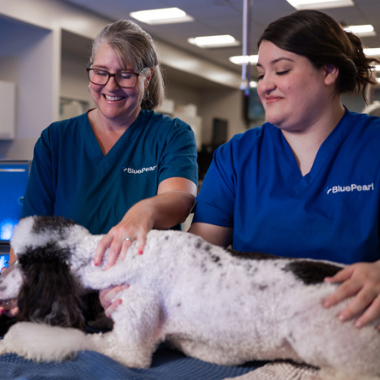Pet critical care by BluePearl.
Pet emergencies can be scary – we’re here to help you handle them.
We understand that seeing your pet sick, hurt or in distress can be stressful – especially if you don’t know what’s wrong. Fortunately, our experienced critical care clinicians are prepared to take action to provide lifesaving care
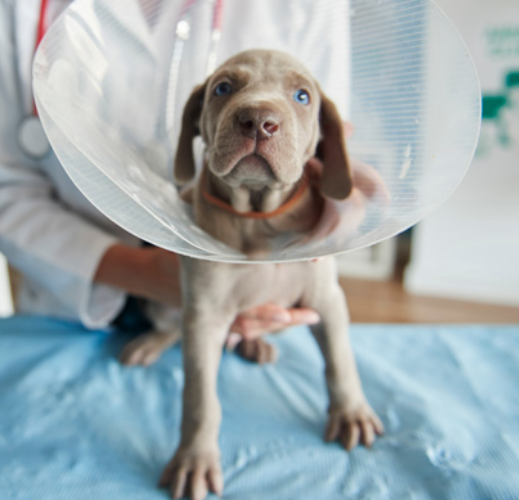
Conditions we treat.
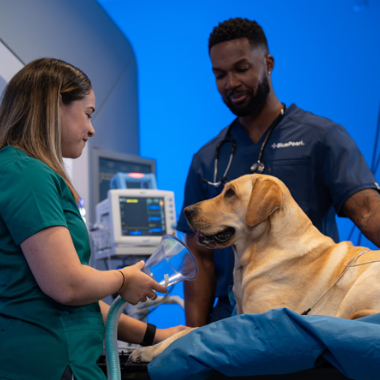
If your pet is experiencing a critical condition, you’ll have an entire veterinary team helping them so you can get back to what matters most – spending precious moments together.
Common cases that we see in the ICU include:
- Post-surgery recovery
- Trauma
- Sepsis
- Respiratory distress
- Pneumonia
- Shock
Services we offer.
Your pet will receive unparalleled medical care during their time at the hospital (and they’ll be spoiled with love and attention, too).
Advanced diagnostics
Your pet can’t tell us what’s wrong, so we use sophisticated diagnostics and imaging tools to uncover the source of the problem.
- Blood/urine testing
- Electrocardiography (ECG)
- Endoscopy
- Ultrasound
- Radiography (x-rays)
Treatment plans
Just as no two patients are the same, neither are their treatment plans. Our critical care team has experience with a range of advanced procedures and minimally invasive care options to get your pet on the path to wellness, including:
- Blood transfusions
- Electrolyte replenishment
- Oxygen therapy
- Breathing support
- Catheterization
- Nutritional support
- IV fluid therapy
Our board certified specialists and critical care team.
Experience makes all the difference.
Our critical care team is made up of veterinarians, vet technicians and assistants, and support staff with rigorous training and experience in specialty medicine. The team works hand in hand to provide the comprehensive, compassionate care your pet needs and deserves. Because we’re a multidisciplinary hospital, the team can consult the expertise of other specialty departments, too.
Sonya Hansen
DVM, MS, DACVECCDr. Sonya Hansen has a strong interest in educating others through hands-on teaching and lectures. She particularly enjoys treating trauma, acute kidney injuries and endocrine emergencies, as well as tailoring fluid therapy for her patients’ individual needs.
- Diplomate, American College of Veterinary Emergency & Critical Care
- Residency, Emergency & Critical Care, Auburn University, AL
- Master of Science, Veterinary Biomedical Sciences, Auburn University, AL
- Internship, Emergency & Critical Care, Auburn University, AL
- Internship, Small Animal Medicine & Surgery, Michigan State University, East Lansing
- Doctor of Veterinary Medicine, University of Minnesota, St. Paul
- Bachelor of Arts, Anthropology, Grinnell College, IA
Outside of work, Dr. Hansen enjoys spending time with her husband, daughter, two dogs and two cats. She also likes exercising, traveling and trying new breweries and restaurants.
Jennifer Holm
DVM, DACVECCSkilled in all aspects of critical care, Dr. Jennifer Holm particularly enjoys treating trauma cases.
- Diplomate, American College of Veterinary Emergency & Critical Care
- Residency, Veterinary Emergency and Critical Care, Tufts University, North Grafton, MA
- Internship, Dove Lewis Emergency Animal Hospital, Portland, OR
- Doctor of Veterinary Medicine, University of Minnesota, St. Paul
- Bachelor of Animal Science, University of Minnesota, St. Paul
Dr. Holm like reading, spending time with her family and walking her dog.
Austin Luskin
VMD, DACVECCDr. Austin Luskin’s clinical interests include managing sepsis, trauma and respiratory emergencies.
- Diplomate, American College of Veterinary Emergency and Critical Care
- Residency, Small Animal Emergency & Critical Care, University of Minnesota, Minneapolis
- Internship, Small Animal Medicine & Surgery, University of Minnesota, Minneapolis
- Doctor of Veterinary Medicine, University of Pennsylvania, Philadelphia
- Bachelor of Science, Biology, Franklin and Marshall College, Lancaster, PA
Lisa Powell
DVM, DACVECCDr. Lisa Powell came to BluePearl with 15 years of experience as an intensive care unit director and professor at the University of Minnesota. A consummate educator and prolific writer, she has held editorial positions with the Journal of Veterinary Emergency and Critical Care and Clinician’s Brief. She has worked with the St. Paul police and fire departments and in 2011 was awarded the Minnesota Public Safety Service Award of Merit for going above and beyond to help save the life of a police K-9 who was stabbed in a robbery attempt. Dr. Powell’s clinical interests include treatment of septic, critically ill patients and respiratory disease, especially conditions requiring mechanical ventilation. Some of her favorite cases to treat are trauma and toxicities because of the number of successful outcomes.
- Diplomate, American College of Veterinary Emergency & Critical Care
- Residency, Emergency & Critical Care, Tufts University, North Grafton, MA
- Internship, Small Animal Medicine & Surgery, Animal Medical Center, New York, NY
- Doctor of Veterinary Medicine, Texas A&M University, College Station
- Bachelor of Science, Veterinary Medicine, Texas A&M University, College Station
Dr. Powell’s favorite pastimes include exercising, biking, swimming, hiking and traveling, especially to a beach. Her furry family includes an orange tabby, a black kitty, a lab, a hound mix and a Pomeranian.
Mallory Salcedo
DVM, DACVECCDr. Mallory Salcedo is particularly interested in shock and resuscitation including microcirculatory monitoring, SIRS/sepsis, respiratory failure and mechanical ventilation.
- Diplomate, American College of Veterinary Emergency & Critical Care
- Residency, Emergency & Critical Care, University of Minnesota, St. Paul
- Internship, Small Animal Medicine & Surgery, Veterinary Specialty Hospital of San Diego, CA
- Doctor of Veterinary Medicine, Washington State University, Pullman
- Bachelor of Science, Animal Science, California Polytechnic University, Pomona
Dr. Salcedo’s favorite pastimes include riding horses, spending time in the garden and yard, painting, and visiting family in California. Jezebel and Tonka are her two pugs, and Mushu is her Himalayan cat.
What to expect.
We want you to be prepared for your pet’s visit to the ICU, so you have one less thing to worry about. Our entire BluePearl team will be with you every step of the way.
How the ICU works
First, your pet will be triaged and cared for by our emergency medicine team. If they require hospitalization, your pet will be seamlessly transferred to the ICU, where our critical care team will stabilize and monitor them around the clock.
We know how difficult it is to be separated from your pet during this critical time, so we’ll keep you updated on their condition and continue to discuss testing and treatment options with you. Once your pet is stable, you’ll be able to give them more love and attention during visiting hours.
Our team will continue to partner with your primary veterinarian as part of the ongoing management of your pet’s care.
You know your pet better than anyone, and you play a crucial role in any follow-up treatment necessary. If you have any concerns about providing care at home after being discharged from the hospital (such as giving medication or monitoring your pet’s symptoms), let us know – we’re here for you.
